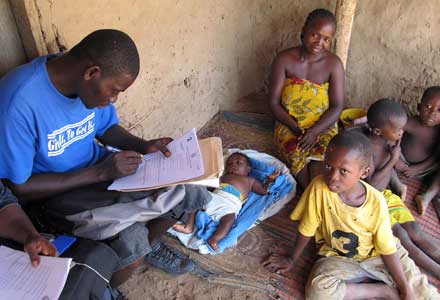$180 million to aid global health
A USAID award will fund another five years of MEASURE Evaluation, which evaluates public health programs around the world to ensure government funds are being used effectively.

The University of North Carolina at Chapel Hill’s Carolina Population Centerhas received a five-year, $180 million award for its Monitoring and Evaluation to Assess and Use Results (MEASURE) Evaluation project from the U.S. Agency for International Development (USAID).
The award, which goes into effect today (July 1) and is the second largest ever received by UNC-Chapel Hill, supports Phase IV of an effort begun in 1997. With possible associate awards from USAID missions and bureaus in other countries, the total award could grow to more than $300 million.
The award funds another five years of MEASURE Evaluation, which evaluates public health programs around the world to ensure government funds are being used effectively.
MEASURE Evaluation is USAID’s flagship project for monitoring and evaluating spending on international global health. The project is implemented by a team of organizations led by UNC-Chapel Hill, working with Futures Group, ICF International, John Snow Inc., Management Sciences for Health and Tulane University.
“MEASURE Evaluation has played a key role in an incredibly successful international effort to bend the epidemic curve. The global community has taken what was an upward trajectory for AIDS, malaria and tuberculosis and turned it into a downward one,” said Project Director Jim C. Thomas, Ph.D., an associate professor of epidemiology in UNC’s Gillings School of Global Public Health. “As we continue to address global health issues, we are honored to be entrusted by USAID to carry on the work of MEASURE Evaluation, and we look forward to a strong partnership with USAID for years to come.”
“Including this $180 million award, MEASURE Evaluation has received nearly $600 million in federal funding over the last 17 years,” said Chancellor Carol L. Folt. “This funding is a direct result of the talented and hard-working team of researchers, faculty and students behind the project. We couldn’t be more proud of the great work being led by the Carolina Population Center and their partners.”
To date, MEASURE Evaluation has focused on building the foundations and capacity to enable monitoring and evaluation in developing countries. The objective of Phase IV is to work toward sustainability of that work, strengthening host-country systems that generate high-quality health information used for decision-making at local, national and global levels. Progress toward this objective will contribute to improve health programs and policies, which ultimately impact overall health outcomes. The project will achieve this objective by concentrating on achieving four results:
- Strengthened collection, analysis and use of routine health data;
- Improved country-level capacity to manage health information systems, resources and staff;
- Methods, tools and approaches improved and applied to address health information challenges and gaps; and
- Increased capacity for rigorous evaluation.
“We will respond to the complexity of this task by applying more systems thinking. There are many moving parts affecting each other and systems thinking provides ways to achieve progress in the midst of complexity,” said Thomas.




